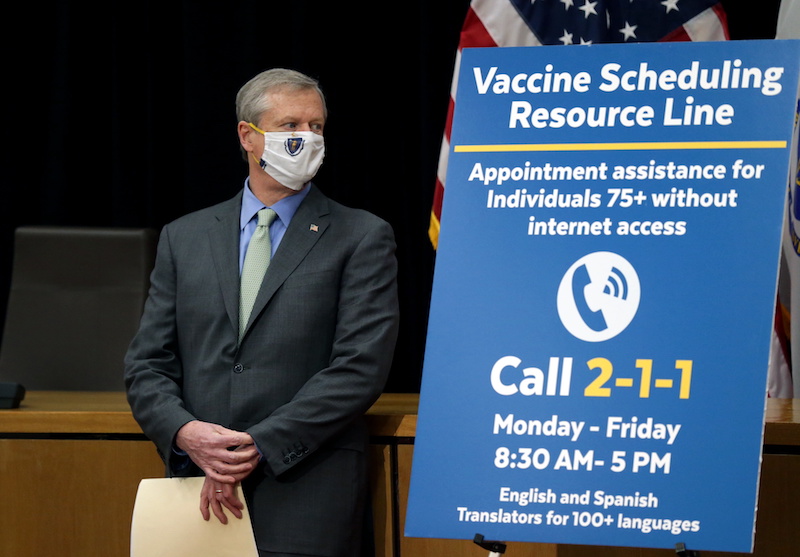By Colin A. Young
State House News Service
Gov. Charlie Baker spoke about the state’s COVID-19 vaccine rollout and engaged in a back-and-forth on the particulars of the effort with the Legislature’s COVID-19 committee for an hour Thursday, but co-chair Rep. Bill Driscoll thought the gravity of the issues residents have faced in securing a vaccine had not gotten through to the state’s chief executive.
“I just really want to stress that I think you’re missing how broken the system is right now and the approach is not working for the citizens of the commonwealth,” the Milton Democrat said as Baker prepared to log off from the hearing. “It needs to be addressed.”
Baker logged onto the Legislature’s first COVID-19 oversight hearing Thursday morning armed with statistics about the state’s improving virus conditions and his administration’s efforts to get COVID-19 vaccines into the arms of more residents.
Massachusetts is tops in the nation for first doses administered per capita among states with five million or more people; the Bay State has administered more than three times more doses per capita than the European Union and more than five times more per capita than Canada; the state ranks second in the country for percentage of Black residents who have gotten at least one shot; and “much of the news on COVID is better than it’s been in quite some time,” the governor said from his ceremonial office in the State House.
That wasn’t exactly the conversation the new Joint Committee on COVID-19 and Emergency Preparedness was interested in having, though the chairs also acknowledged the improving conditions.
“Unfortunately, these hopeful figures do not tell the whole story,” Driscoll said after himself referencing recent improvements in COVID-19 metrics here in his opening remarks. “These numbers hide the confusion caused by frequent pivots and course corrections, and the daily frustrations residents face trying to access the vaccine. Residents must book their appointments on cumbersome and flawed websites and hope their internet connection is stronger than the thousands of others competing for the same batch of limited appointments. The system benefits those with time, resources, and mobility and disadvantages those most vulnerable populations that have suffered disproportionately from this pandemic. It tries to prioritize efficiency over equity.”
Baker, in his prepared remarks and in response to questions from lawmakers, cited the constraints in the supply of the two federally-approved vaccines as the primary challenge and defended his administration’s decisions to prioritize groups that other states did not, like group home residents and staff, inmates and staff at prisons and jails, and all hospital workers.
“I think many states chose to pursue a variety of different approaches to this which makes it hard to draw really broad comparisons between states,” the governor said. “As I said in my remarks, Massachusetts chose early on to prioritize a number of communities and a number of professions that weren’t prioritized in other states that did make us look, if you just based it on the numbers, like a low performer relative to many other states that didn’t focus on those hard-to-reach populations that we chose to focus on.”
More than 1.5 million doses of COVID-19 vaccine had been administered in Massachusetts as of Wednesday, the Department of Public Health said.
There were 1,084,888 people as of Wednesday who had received at least one dose of a vaccine — an increase of 23,553 people since Tuesday — and 433,593 people have gotten both doses of the vaccine, an increase of 18,652 people from Tuesday’s report. In all, Massachusetts has administered 1,518,481 doses of the vaccine, which is 76.9 percent of the 1,973,900 doses the federal government has shipped here.
In his prepared remarks, Baker acknowledged the frustration that many residents have experienced as they try to use the state’s website to get a vaccination appointment for themselves or a loved one but he defended the site as an important reason for the state’s vaccination numbers and suggested some of it was inevitable given that “demand outstrips supply 10 times over.”
“I understand the enormous frustration when so many people are attempting to secure a small number of appointments. However, for all its faults, people from every corner of the commonwealth have managed to book over 300,000 vaccination appointments on that site since it went live back in January,” he said. “And that does have something to do with why Massachusetts has been able to vaccinate more than a million people since the start of this effort.”
Last Thursday, as more than 70,000 appointments were to be made available to the seniors and people with multiple health complications who newly qualified for a vaccine, heavy traffic torpedoed the state’s vaccination scheduling system and website. Baker said he was “pissed off” about the fiasco and vowed that “it’s gonna get fixed.”
Though this week’s release of 50,000 vaccine appointments for eligible residents did not appear nearly as chaotic as last week’s fiasco and the Baker administration had made changes to the website and scheduling system like adding a virtual waiting room, some vaccine hunters reported estimated wait times measured in days.
The most confrontational moments during Baker’s appearance before the joint committee came during questioning from Sen. Eric Lesser, who pressed the governor on his previous comments about the website and said the rollout “has not been lumpy and bumpy” as Baker often describes it. “It has been a failure,” Lesser said.
“The biggest challenge with the website, from the beginning, has been supply and the fact that people get frustrated — and I understand why — when they can’t access an appointment,” Baker said, adding at various points during the hearing that his team plans to roll out improvements to the website as they become ready.
Lesser countered that “nobody disagrees with you that the supply is limited” but said that “it wouldn’t have made a difference” if Massachusetts had 1 million doses available and the website still crashed. He then asked Baker if his administration had conducted a “load analysis” before announcing that 1 million more people would become eligible last week.
“What happened to the website is on us,” Baker said.
Lesser asked, “Will you say sorry for the million people?”
“Of course, absolutely. Definitely. Yes, of course,” Baker said. “And it’s going to be a constant challenge going forward that we don’t have enough supply to serve the population that wants to get vaccinated. I hope at some point that’s not true anymore.”
The website and scheduling system snafu of last week and Thursday’s waiting room frustration were the latest stumbles in the Baker administration’s vaccine rollout. House Speaker Ronald Mariano has said the rollout “has been marked by both logistical and communications shortcomings” and Senate President Karen Spilka called it a “constantly changing and confusing” plan.
Complaints from residents in the earliest phases of the plan prompted changes to the appointment website, which was initially just a map of vaccination sites. The administration established a call center to help people access appointments, but only after seniors 75 or older became eligible and reported difficulties using the website.
Baker also announced a system in which anyone who brings a senior 75 or older to a mass vaccination site can get vaccinated themselves, regardless of their age or risk factors. The goal was to help ensure that those most at risk of dying from COVID-19 get vaccinated, but critics said it also effectively created black market for senior citizen companions and questioned the sudden vaccination eligibility for healthy companions.
“Frankly, I am just baffled at what we’ve been through and my experience of this is very different than the one you’ve laid out,” Sen. Cindy Friedman told Baker. “The twists and turns, the change in plans, the communication that changes depending on who you are talking to and from day to day, the utter uncertainty of how this vaccine rollout was going to roll out and is rolling out — I can say as someone who has been involved in this process, and deeply involved since last March, that even I, with all my knowledge, am completely at a loss as to what is going on at times and what is going to come next.”
Driscoll and his Senate co-chair, Sen. Jo Comerford of Northampton, each asked Baker to provide the committee with specific information and various documents. Driscoll requested details on and a timeline for the website improvements Baker mentioned.
Comerford asked for a “vaccine leadership organizational chart,” a detailed picture of the hierarchy at the state’s COVID-19 Command Center, the contracts for myriad vendors the state is working with on vaccine distribution, and a detailed accounting of federal funds that have flowed to Massachusetts during the pandemic and recovery.
The governor was happy to fulfill the request for the federal aid details during Thursday’s hearing, though Comerford soon cut him off and asked that he present the information in writing so as to not take away time for lawmakers to ask him questions.
“I actually did spend a little time because I thought that might be important to you guys … $71 billion has come to Massachusetts one way or another, through the four major federal relief programs. Twenty billion six hundred thousand of that went to unemployment insurance, $27 billion of that went to the PPP program for businesses, $8 billion went to stimulus checks,” Baker said. He added after Comerford made note of the time and asked him to submit the rest in writing, “OK, either way.”
During the livestream, Driscoll also requested that Baker make time in two weeks to again testify before the Joint Committee on COVID-19 and Emergency Preparedness as it embarks on a series of hearings.
“Well this one’s been so much fun, I’ll certainly look forward to coming back,” the governor said. He added, “Yeah, sure, I’ll come back in a couple of weeks. But part of the reason for that is because I recognize and understand that these challenges are ones that whether you’re in state government, local government, federal government, this thing is a bear to wrestle to the ground and we all, in our own way, have had to deal with that on behalf of our constituents over the course of the past year.”
 New Bedford Guide Your Guide to New Bedford and South Coast, MA
New Bedford Guide Your Guide to New Bedford and South Coast, MA









